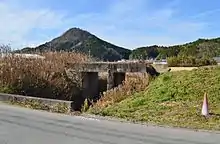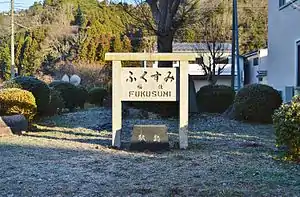| Sasayama Line | |
|---|---|
| Overview | |
| Status | Discontinued |
| Owner | Japanese National Railways |
| Termini | |
| Stations | 6 |
| History | |
| Opened | 21 March 1944[1] |
| Closed | 1 March 1972[2] |
| Technical | |
| Line length | 17.6 km (10.9 mi) |
| Track gauge | 1,067 mm (3 ft 6 in) |
Sasayama Line | ||||||||||||||||||||||||||||||||||||||||||||||||||||||||||||||||||||||
|---|---|---|---|---|---|---|---|---|---|---|---|---|---|---|---|---|---|---|---|---|---|---|---|---|---|---|---|---|---|---|---|---|---|---|---|---|---|---|---|---|---|---|---|---|---|---|---|---|---|---|---|---|---|---|---|---|---|---|---|---|---|---|---|---|---|---|---|---|---|---|
| ||||||||||||||||||||||||||||||||||||||||||||||||||||||||||||||||||||||
Sasayama Line (篠山線, Sasayama-sen) was a railway line operated by Japanese National Railways that connected Sasayamaguchi Station with Fukusumi Station in present-day Tamba-Sasayama, Hyōgo, Japan. The line was discontinued on 1 March 1972.[2][3]
Data
The single-track 1,067-mm gauge railway was operated between Sasayamaguchi and Fukusumi (17.6 km) with six stations including both termini. The line was not electrified.
History

During World War II, the railway line was constructed for transport of manganese and quartz sand, as a part of plan to connect Sasayamaguchi Station with Sonobe Station as bypass of Sanyo Main Line. In 1944, the line was open to traffic in the section between Sasayamaguchi Station and Fukusumi Station. At the same time, the Sasayama Railway which opened in 1913 was discontinued. In 1945, the end of the war led to the discontinuation of the construction of the remainder of the planned line to Sonobe Station.
After that, despite contribution to locals, ridership was low and in 1968, the line was listed as one of 83 unprofitable lines for consideration of closure.[3] Consequently on 1 March 1972, the line was closed.
Besides, the Enjō Line (園篠線, Enjō-sen) bus route has been operated between Sasayamaguchi Station and Sonobe Station by Japanese Government Railways and Japanese National Railways since 1934.[4][5] This line was inherited to West JR Bus, but JR withdrew from the operation in 2002. The line was substituted by Shinki Bus that runs between Sasayamaguchi Station and Fukusumi Station, and Keihan Kyoto Kotsu that runs between Fukusumi Station and Sonobe Station.
Stations
| Station name | Between stations (km) | Distance from terminus (km) | Connection | Location |
|---|---|---|---|---|
| Sasayamaguchi Station | - | 0.0 | Japanese National Railways: Fukuchiyama Line | |
| Sasayama Station | 5.0 | 5.0 | ||
| Yakami Station | 3.8 | 8.8 | ||
| Tamba-Hioki Station | 1.8 | 10.6 | ||
| Murakumo Station | 3.6 | 14.2 | ||
| Fukusumi Station | 3.4 | 17.6 | ||
 Tamba-Hioki Station
Tamba-Hioki Station Murakumo Station
Murakumo Station
References
- ↑ 「運輸通信省告示第78号」『官報』1944年3月20日 - National Diet Library Digital Collection
- 1 2 三宅俊彦『日本鉄道史年表(国鉄・JR)』グランプリ出版、2005年、p.122
- 1 2 種村直樹『ローカル線の旅』(1981年12月15日 日本交通公社出版事業部 発行)
- ↑ 3月28日篠山-原山口間営業開始「鉄道省告示第115号」『官報』1934年3月24日(National Diet Library Digital Collection)
- ↑ 7月11日園部-原山口間営業開始「鉄道省告示第310号」『官報』1934年7月7日(National Diet Library Digital Collection)